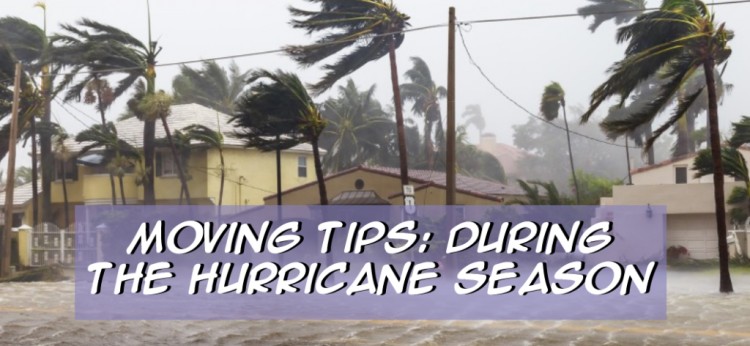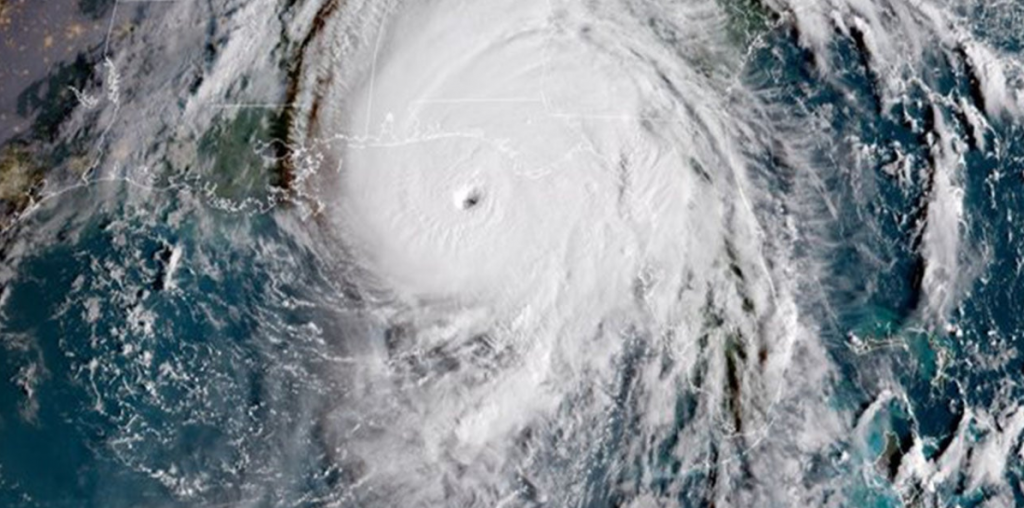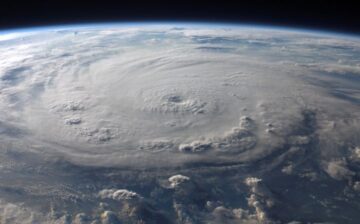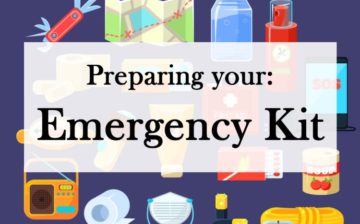Hurricane season may not be the ideal time to move, but sometimes you have no choice. With proper planning you can certainly make it work. This post will give you some valuable tips. After being informed with this guide your hurricane season move is guaranteed to be safe and stress-free.
When is the hurricane season?
The Atlantic hurricane season starts on June 1st and runs until Nov. 30th. In the Eastern Pacific Ocean, hurricane season begins May 15th and ends Nov. 30th, according to the National Weather Service. However, most of these storms hit during peak hurricane season between August and October, on both coasts, according to the National Weather Service’s Climate Prediction Center.
Once a storm has wind speeds of 38 mph, it is officially a tropical storm. At 74 mph, the storm has reached hurricane levels.
- A category 1 hurricane could cause Minimal damage. With some roof leakage, gutter damage, snapped tree branches and toppled trees with shallow roots.
- A category 2 hurricane could cause Moderate damage, with major roof and siding damage; uprooted trees could block roads; power loss possible for days to weeks.
- A category 3 hurricane could cause Devastating damage, with gable and decking damage, many more uprooted trees and extended power outages.
- A category 3 hurricane could cause Catastrophic damage; roofs and exterior walls will be destroyed; trees will snap; power outages for weeks to months. Large area uninhabitable for weeks or months.
- And finally, a category 4 hurricane could cause High fraction of framed houses will be destroyed; power outages for weeks to months; and huge swaths uninhabitable for the same period.
Is your home covered?
It’s important to make sure your home is insured during your move this hurricane season. If you live in a region that is usually prone to hurricanes, you will likely have certain emergency evacuation plans in place. But do you know what kind of insurance you may need to provide coverage for the kinds of damage a hurricane can cause? The answer may depend on where you live. Also, what types of damage your home sustains, what limitations your policy may have in place, and how much coverage you purchase.
If you’re planning to move your home during a hurricane, you now have two homes to worry about. But no worries! Even though you may be not able to do anything about your future home before taking possession, if it sustains significant damage, you might change your mind about the place. Worst case scenario you may need to find temporary living quarters until you can get in to your new home.
Don’t forget to protect your current home. You don’t want to worry about losing a security deposit or having a buyer back out because you didn’t want to take extra steps to board windows or protect the structure where possible. Property owners and renters should be sure to insure their homes against flooding. Sometimes many people do not realize it is not a part of standard home and renter’s insurance. Tenants and home owners can contact their renters or home insurance provider to buy flood insurance, and they should do so even if they do not live right along the coastline.
Be packed and Ready
Those living in or near hurricane areas should make copies of proof of ownership documents of any property not limited to their homes, cars and boats. These documents can be stored in the hurricane kit or in any safe location that does not risk being damaged during the hurricane. This is a common emergency preparedness tip as well as a common moving day tip—making it even more important when disaster coincidences with moving day.
The first hurricane safety tip is to make sure to keep the following items handy before the hurricane starts. That way, you have them if you need to evacuate. Also, make sure to store it in something that will be easy to carry, waterproof, and secure. For example, a backpack or duffle bag.
Make sure you have all critical documents together and easily accessible. Such as, insurance policies, birth certificates, titles of ownership, passports, checkbooks, health cards and social security numbers, etc. This should all be a part of your emergency package. This way you have all your most important information safe and protected from any possible issue.
https://www.allaroundmoving.com/hurricane-safety-season/
Inform Your Moving Company
After realizing that you may be moving during a possible hurricane, make sure to call your moving company. Also, your present and future landlords to discuss options. If it happens to be the off season or a slow period, they might be able to reschedule your moving day. That way, you could be settled in your new place before the hurricane even arrives.
In the case that they can’t, they should be able to tell you how they plan to communicate changes. Additionally, they will inform you what their action plan is in case of an emergency. Will there be a queue for rescheduling move dates? Or perhaps, will your landlord allow you to move in earlier? These are all important questions to ask. Make sure to find out where you can get real-time updates during the hurricane by subscribing to alerts.
Post Hurricane
If you’ve evacuated the area, wait for public officials to say it is safe before returning. Each year, a significant number of people are injured or killed while cleaning up after a hurricane. As you begin cleanup, keep these safety tips in mind:
STAY SAFE: Do not wade in floodwaters, which can contain dangerous debris like broken glass, metal, dead animals, sewage, gasoline, oil, and downed power lines. Do not enter a building until it has been inspected for damage to the electrical system, gas lines, septic systems, and water lines or wells. Wear appropriate protective equipment such as gloves, safety glasses, rubber boots, and masks. This is to protect you from debris and airborne particles, e.g., mold and dust. Do not use electrical equipment if it is wet or if you are standing in water. Protect your pet following a hurricane.
STAY HEALTHY: Throw out any food including canned items that were not maintained at a proper temperature or have been exposed to floodwaters. Do not eat food from a flooded garden. When in doubt, throw it out. Avoid drinking tap water until you know it is safe. If uncertain, boil or purify it first. Clean and disinfect everything that got wet. Mud left from flood water can contain sewage, bacteria, and chemicals.
Ready to Move
Regardless of whether you’re moving during or after the hurricane season, let All Around Moving Services take care of your move. We keep your items safe while moving them to wherever you need to go. We offer local, long distance, and commercial moving. Additionally, we offer international shipping and moving.
Among the few Moving and Storage companies in New York City NY & Miami FL accredited by the BBB. Get a free customized movers and storage services quotes. Pick the moving company in New York and Miami that has the experience to arrange a successful move of your household goods.
Have Experience in the Moving Industry? Want an Additional Income Stream? Work With All Around Moving!
All Around Moving’s Work With Us program provides experienced moving consultants with the opportunity to run their own Relocation Consultant business from anywhere in the USA. We provide licensing, dedicated phone lines and email hosting, moving software for lead tracking, invoicing, and complete set up.
We’ll even provide the carriers, or you can use your own. A nominal one-time start up fee gives you initial-customer-leads to get your business up and running. There are no recurring expenses, except purchasing your own leads. We share profits 50-50 with you from all jobs you book with us. Click here to learn more.






